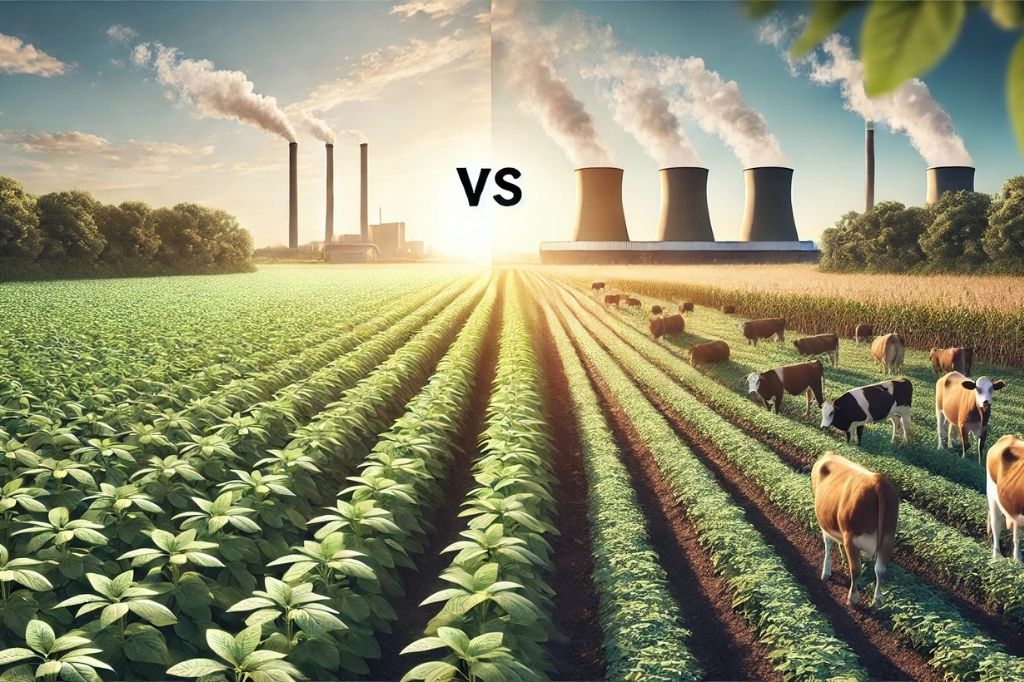Ah, here’s the big debate: Meat or soy? Environmentalists are arguing, gourmets are surprised, and we are reading this on the screen. So really is soy production clean energy compared to beef production? So on the one hand there are big fat cattle grazing, and on the other there are innocent soybeans growing in the field. Who is environmentally friendly, who consumes more resources?
In this article, we will dive into the depths of this problem both seriously and somewhat humorously. Don’t crunch your bones; here we go!
Soy: Although It Looks Innocent, What is in the Background?
Soy production is often touted as an environmentally friendly hero. It consumes little water, has low carbon emissions and is the mainstay of vegan burgers. But the truth may not always be what it seems.
1. Less Water Use: Yes, let’s face it, soy production uses much less water compared to beef. So we can say, ”this plant does not cry from thirst”. But besides, in some regions, soy plantations can seriously deplete water resources. Plantations in tropical regions are a separate topic of discussion.
2. Carbon Footprint: There are no cows that emit methane Tue gas while growing soybeans. But as the fields expand, the forests decrease. Before saying ”soy environmentalist”, it is necessary to think about the losses in the Amazon forests.
3. Pesticide and Fertilizer Problem: Chemicals used during soy cultivation can destroy nature. Except for the organic soy that you grow on your own field, of course. He’s still innocent!
Beef: The Carbon Bomb of the Meat Sector
Although cows say “Love me” with their eyes, this love can be a little heavy from the environmental costs. *Beef production* is a complete energy vampire in terms of carbon emissions and resource consumption. But let’s look at the details!

1. Methane Gas Problem: Yes, cows warm the world with their digestive systems. Each ”moo” actually means a little more methane release. This gas also contributes to the greenhouse effect. So cows, the world is getting warmer, just so you know!
2. Water Consumption: The amount of water required to produce a kilo of meat is incredible. Each of the cows works almost like a water tank. When you think about the water they drink, it may be passing through you to say “Fie now”.
3. Land Use: Cattle breeding requires large pastures. This means the destruction of forests and the loss of habitats. There is no forest, but there are hamburgers. Do you think it’s worth it?
Energy Efficiency: Calories and Environmental Balance
When we compare in terms of energy efficiency, soy production and beef production give quite different results. But as always, “who is better?” the answer to your question is a little complicated.
1. Calorie and Protein Production: Soy can feed more people with the same energy expenditure. Beef, on the other hand, may be richer in protein, but it is much more costly in terms of energy density.
2. Fossil Fuel Use: Beef production consumes considerable energy in feed production, transportation and processing processes. Soybeans consume less energy in this respect, but fossil fuels come into play again in large-scale agriculture.
3. Soil and Resource Use: Soybeans require much less land compared to beef to provide the same amount of protein. But monoculture agriculture appears here again as an environmental problem.
Jul, Whose Energy Is Cleaner?
Is soy production clean energy compared to beef production The answer to the question depends on the context. In general, soy production seems to be more environmentally friendly compared to beef. However, this does not mean that soy wins in every case.

While beef production has huge environmental costs, soy farming is also not completely exempt from the problems. The important thing is to make more sustainable choices individually and socially. Hamburger or soy burger? Perhaps the answer may be to consume less of both. But the decision is yours!
Remember: saving the world can’t happen all at once. Start with small steps, a little soy, a little love, a little empathy. Who knows, maybe one day the cows will thank you too!